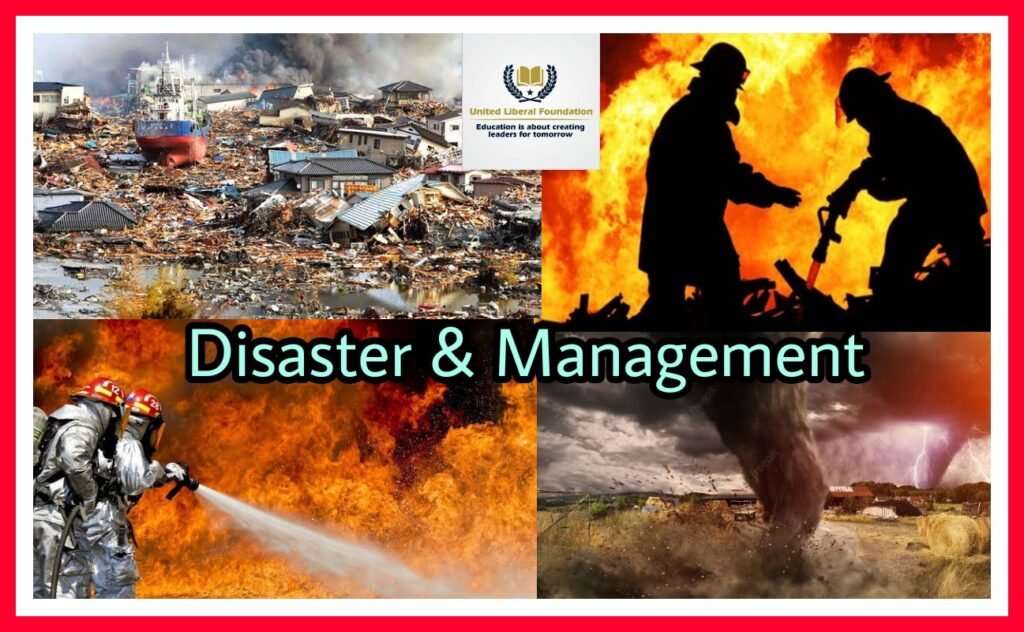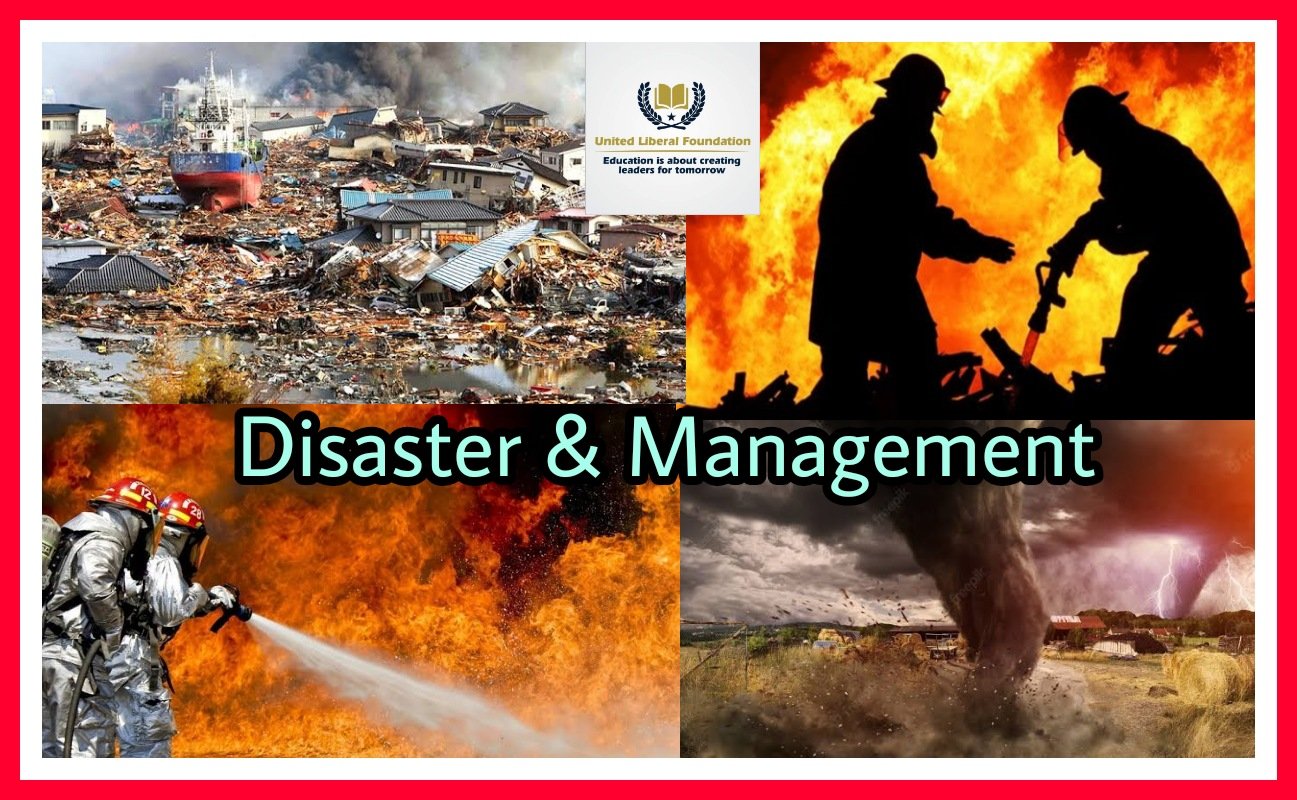
◆ United Nations Office for Disaster Risk Reduction (UNISDR) defines disaster as “a serious disruption of the functioning of a community or a society at any scale due to hazardous events interacting with conditions of exposure, vulnerability and capacity, leading to one or more of the following: human, material, economic and environmental losses and impacts.” (UNISDR 2016).
आपदा जोखिम न्यूनीकरण के लिए संयुक्त राष्ट्र कार्यालय (UNISDR) आपदा को “किसी भी पैमाने पर किसी समुदाय या समाज के कामकाज में एक गंभीर व्यवधान के रूप में परिभाषित करता है, जो जोखिम, भेद्यता और क्षमता की स्थितियों के साथ बातचीत करने वाली खतरनाक घटनाओं के कारण होता है, जिसके कारण एक या अधिक निम्नलिखित: मानव, सामग्री, आर्थिक और पर्यावरणीय नुकसान और प्रभाव।” (यूएनआईएसडीआर 2016)
The Disaster Management Act 2005 uses the following definition for disaster:
आपदा प्रबंधन अधिनियम 2005 आपदा के लिए निम्नलिखित परिभाषा का उपयोग करता है:
◆ Disaster” means a catastrophe, mishap, calamity or grave occurrence in any area, arising from natural or manmade causes, or by accident or negligence which results in substantial loss of life or human suffering or damage to, and destruction of, property, or damage to, or degradation of, environment, and is of such a nature or magnitude as to be beyond the coping capacity of the community of the affected area.”
आपदा” का अर्थ किसी भी क्षेत्र में प्राकृतिक या मानव निर्मित कारणों से, या दुर्घटना या लापरवाही से होने वाली किसी भी आपदा, दुर्घटना, आपदा या गंभीर घटना से है, जिसके परिणामस्वरूप जीवन की पर्याप्त हानि या मानव पीड़ा या क्षति, और संपत्ति, या क्षति का विनाश होता है। पर्यावरण के लिए, या उसका क्षरण, और इस तरह की प्रकृति या परिमाण का है जो प्रभावित क्षेत्र के समुदाय की मुकाबला करने की क्षमता से परे है। ”
Hazard
खतरा
◆ A hazard is a threat, a future source of danger with a potential to cause damage to:
एक खतरा एक खतरा है, भविष्य में खतरे का एक स्रोत है जिसके नुकसान की संभावना है:
● People: Death, injury, disease and stress
लोग: मृत्यु, चोट, बीमारी और तनाव
● Property: Damage to property, economic loss, loss of livelihood and status
संपत्ति: संपत्ति को नुकसान, आर्थिक नुकसान, आजीविका और स्थिति की हानि
● Environment: Loss of flora and fauna, pollution, loss of biodiversity.
पर्यावरण: वनस्पतियों और जीवों की हानि, प्रदूषण, जैव विविधता की हानि।
Difference between hazards and disasters
खतरों और आपदाओं के बीच अंतर
| Disaster (आपदा) | Hazard (खतरा) |
| Disaster is an event that occurs suddenly/unexpectedly in most cases and disrupts the normal course of life in affected area. It results in loss or damage to life, property or environment. This Loss is beyond the coping capacity of local affected population/society. And therefore requires external help. आपदा एक ऐसी घटना है जो ज्यादातर मामलों में अचानक/अप्रत्याशित रूप से घटित होती है और प्रभावित क्षेत्र में जीवन के सामान्य पाठ्यक्रम को बाधित करती है। इसके परिणामस्वरूप जीवन, संपत्ति या पर्यावरण की हानि या क्षति होती है। यह नुकसान स्थानीय प्रभावित आबादी/समाज की क्षमता से बाहर है। और इसलिए बाहरी मदद की आवश्यकता है। | Hazard is an event that has potential for causing injury/ loss of life or damage to property/environment. खतरा एक ऐसी घटना है जिसमें चोट/जान की हानि या संपत्ति/पर्यावरण को नुकसान होने की संभावना होती है। |
Important terms used in disaster management:
आपदा प्रबंधन में प्रयुक्त महत्वपूर्ण शब्द:
◆ Hazards: A phenomenon which may cause injury or loss of life, damage to property, social and economic disruption or environmental degradation.
खतरे: एक घटना जो चोट या जीवन की हानि, संपत्ति को नुकसान, सामाजिक और आर्थिक व्यवधान या पर्यावरणीय गिरावट का कारण बन सकती है।
◆ Vulnerability: The potential for loss to an individual, community or place because of a disaster that is affected by geographical as well as social conditions.
सुभेद्यता: भौगोलिक और सामाजिक परिस्थितियों से प्रभावित किसी आपदा के कारण किसी व्यक्ति, समुदाय या स्थान को नुकसान की संभावना।
◆ Community: People who live together in a village or urban areas, which can be identified as local group with a common way of life.
समुदाय: वे लोग जो एक गाँव या शहरी क्षेत्रों में एक साथ रहते हैं, जिन्हें एक सामान्य जीवन शैली वाले स्थानीय समूह के रूप में पहचाना जा सकता है।
◆ First Responders: Group of people who are immediately affected by a disaster, and are the first to respond and help to cope with it, before government or relief agencies can rush to the area.
पहले प्रतिक्रियाकर्ता: लोगों का समूह जो किसी आपदा से तुरंत प्रभावित होते हैं, और सरकार या राहत एजेंसियों के क्षेत्र में पहुंचने से पहले सबसे पहले प्रतिक्रिया करते हैं और इससे निपटने में मदद करते हैं।
Team ULF



